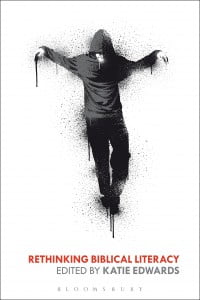Is our culture biblically literate?
 [Stephen Wright writes:] Rethinking Biblical Literacy is a drove of nine essays from unlike authors, exploring ways in which the Bible continues to feature in gimmicky Western culture. Noting the frequent complaints from interested parties nigh a 'decline in biblical literacy', the authors ask probing questions about what this phrase means and how authentic it is. The recurring suggestion is that though traditional forms of 'knowing' the Bible, mediated past religious instruction and Church building education, are indeed in decline, biblical stories and motifs continue to appear in all kinds of cultural expression. This implies that a shared 'memory' of the Bible nonetheless persists, fifty-fifty though that memory no longer serves as a bulwark of Christian orthodoxy.
[Stephen Wright writes:] Rethinking Biblical Literacy is a drove of nine essays from unlike authors, exploring ways in which the Bible continues to feature in gimmicky Western culture. Noting the frequent complaints from interested parties nigh a 'decline in biblical literacy', the authors ask probing questions about what this phrase means and how authentic it is. The recurring suggestion is that though traditional forms of 'knowing' the Bible, mediated past religious instruction and Church building education, are indeed in decline, biblical stories and motifs continue to appear in all kinds of cultural expression. This implies that a shared 'memory' of the Bible nonetheless persists, fifty-fifty though that memory no longer serves as a bulwark of Christian orthodoxy.
The range of case studies presented is fascinating. Function one contains capacity on the (lack of) biblical literacy mediated by Irish religious education, the loose utilize of Scripture in support of both left- and right-wing agendas in mod British politics, and the desirability of extending the concept of 'literacy' beyond the strict focus on a written text in which both religious and secular devotees of the Bible have invested then heavily. Office two offers snapshots of the 'visual' biblical literacy accessible through American TV (the series Lost and The Simpsons franchise), through street art, and through the musical performances of Madonna. Part iii discusses the allusions to Levitical laws in Stieg Larsson's novel The Girl with the Dragon Tattoo (twice adjusted for the screen) and Eddie Izzard'south irreverent have on the Noah story in his standup routine 'Glorious'.
Much of the volume is thus a contribution to the growing field of 'reception criticism', which examines the way that the Bible is received in culture and the insights emerge into Bible and civilisation alike. In this respect I found some chapters more fruitful than others. I was not convinced that the study of Madonna, for all its detailed analysis of her sexually-edged utilise of biblical symbolism, showed much more than than that her handling of biblical topics 'overturns their traditional Christian agreement' (p. 121), which seems most self-evident. More revealing is the chapter on Izzard, a sophisticated piece of cultural criticism that demonstrates the dependence of particular jokes are on audiences' residual noesis of the Bible. In particular, using Julia Kristeva's concept of the 'abject', the author proposes that the Bible 'is the recognizable cultural necessity that modern, mainstream guild would rather forget most simply is irredeemably attached to' (p. 194). Laughter such as that provoked past Izzard'south deconstruction of the Noah story (east.k. where did his family and all the animals go to the toilet?) is seen as a way of coping with the discomfort of this residual attachment.
This collection is the product of a scholarly milieu in which many outside the Christian community are examining Scripture and its cultural resonances, and critiquing (for instance) its implicit sanctioning of violence and patriarchy. There is much here that Christians will detect uncomfortable. Many volition not be persuaded that the kind of 'biblical literacy' in evidence at one of Izzard's shows is the kind that those who bemoan its lack desire to foster. But all Christians and others who value the Bible should pay mind to the prove this book provides that cognition and use of the Bible remains alive in (peradventure) the well-nigh surprising places. Connecting deeply with those places may be a much more effective means of reclaiming a role for the Bible in our societies than more conventional strategies that focus simply on reading the volume.
 Then ministers and local churches who are peachy to deepen their congregations' understanding of the Bible would exercise well to think broadly and creatively about what 'biblical literacy' means and how it might be encouraged. The time-honoured approach of daily Bible reading surely notwithstanding plays a vital role. But it tin can exist supplemented past prompting reflection on the biblical echoes and traces in what people hear and come across around them in the many media which confront u.s. each day. Such echoes and traces may, in turn, inspire Christians to their own creative functioning of Scripture in drama or recital, painting or music; insight into the text tin can come through such imaginative engagement which is not bachelor through silent reading. And all these strands demand the foundation of a continuing lively instruction ministry building which volition ensure that the Bible is not encountered merely equally a serial of blest thoughts, sometimes obscure cultural references, or springboards to creativity, simply every bit a dynamic narrative which helps us to make sense of the globe and alive as God's complimentary children within it.
Then ministers and local churches who are peachy to deepen their congregations' understanding of the Bible would exercise well to think broadly and creatively about what 'biblical literacy' means and how it might be encouraged. The time-honoured approach of daily Bible reading surely notwithstanding plays a vital role. But it tin can exist supplemented past prompting reflection on the biblical echoes and traces in what people hear and come across around them in the many media which confront u.s. each day. Such echoes and traces may, in turn, inspire Christians to their own creative functioning of Scripture in drama or recital, painting or music; insight into the text tin can come through such imaginative engagement which is not bachelor through silent reading. And all these strands demand the foundation of a continuing lively instruction ministry building which volition ensure that the Bible is not encountered merely equally a serial of blest thoughts, sometimes obscure cultural references, or springboards to creativity, simply every bit a dynamic narrative which helps us to make sense of the globe and alive as God's complimentary children within it.
Katie Edwards, ed., Rethinking Biblical Literacy (London: Bloomsbury T & T Clark, 2015), ISBN 978-0-567-05098-4, p/b, 218 + x pp.
Stephen I Wright, Spurgeon'southward College, London.
Follow me on Twitter @psephizo
Much of my work is washed on a freelance footing. If you have valued this mail, would you considerdonating £i.20 a calendar month to support the production of this web log?
If yous enjoyed this, do share it on social media (Facebook or Twitter) using the buttons on the left. Follow me on Twitter @psephizo. Similar my page on Facebook.
Much of my work is done on a freelance footing. If you lot have valued this mail, you tin make a single or repeat donation through PayPal:
For other ways to support this ministry building, visit my Back up page.
Comments policy: Good comments that engage with the content of the post, and share in respectful argue, can add real value. Seek first to understand, and so to be understood. Brand the nigh charitable construal of the views of others and seek to learn from their perspectives. Don't view debate equally a conflict to win; address the argument rather than tackling the person.
Source: https://www.psephizo.com/reviews/culture-biblically-literate/
0 Response to "Is our culture biblically literate?"
Enviar um comentário